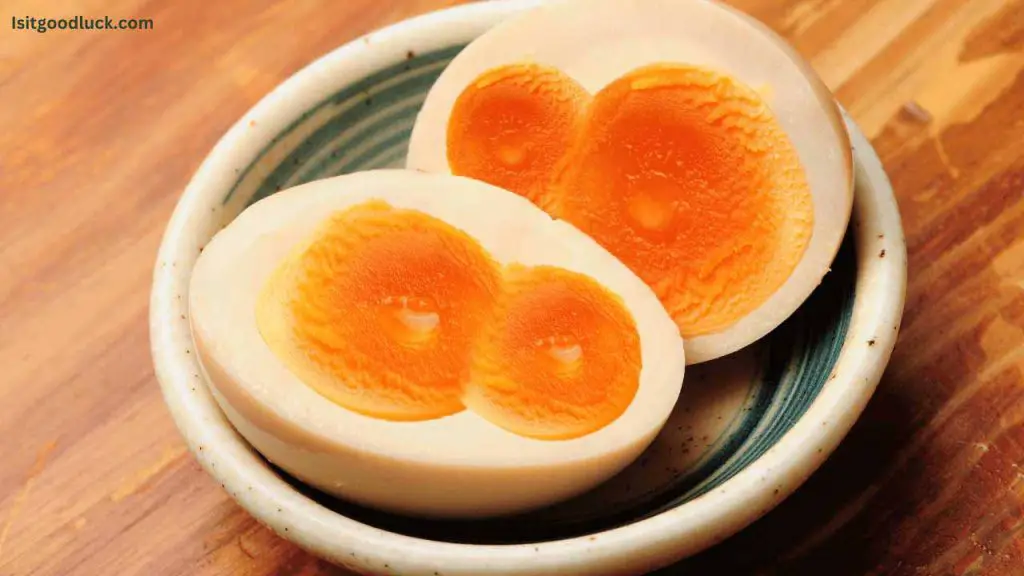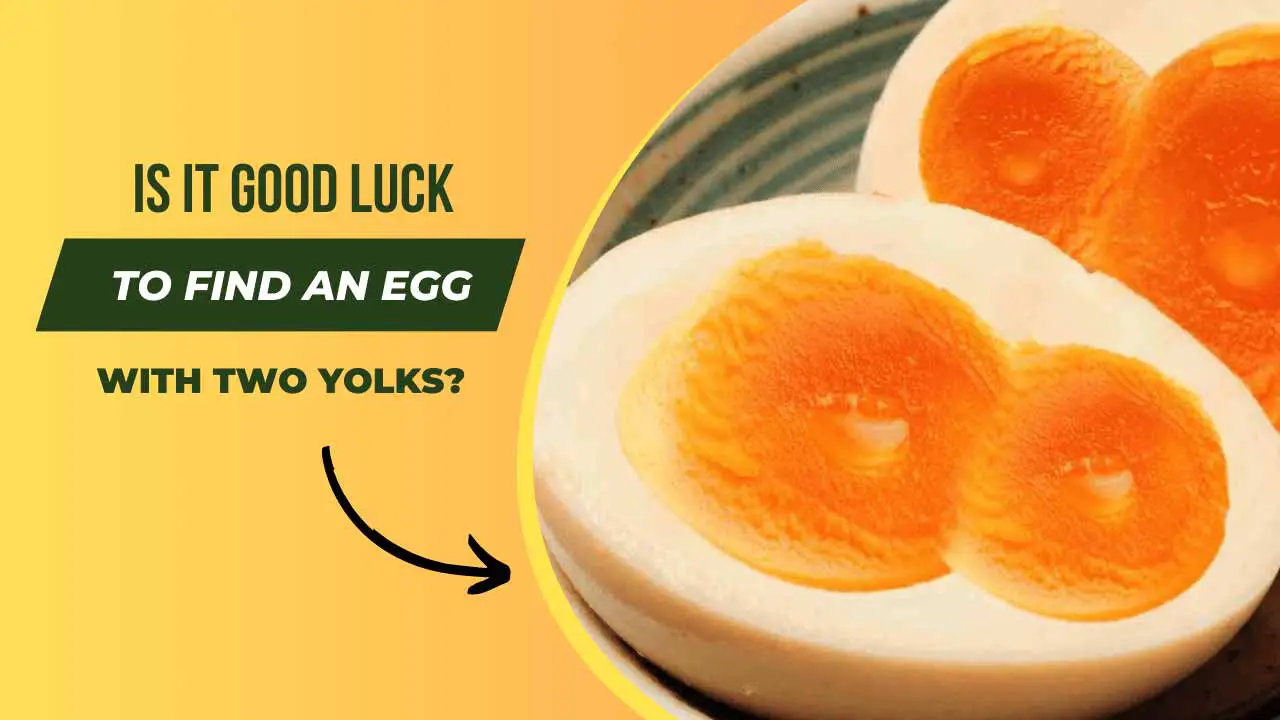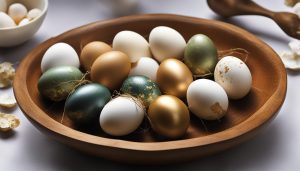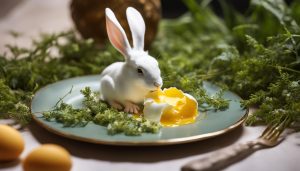Discovering an egg with two yolks can seem like a thrilling find. These unusual eggs are often a source of curiosity and, in some cases, superstition.
Throughout the centuries, cultures worldwide have attributed various meanings to these peculiarities of nature, ranging from good luck symbols to harbingers of death.
So, is there truth behind this superstition? Let’s delve into double-yolked eggs’ historical significance, scientific explanation, nutritional values, and safety aspects.
Contents
- 1 Historical Significance of Double-Yolked Eggs:
- 2 Why Double-Yolked Eggs Occur?
- 3 The Nutritional Value of Double-Yolked Eggs:
- 4 Can You Eat Double-Yolked Eggs?
- 5 Is it Good Luck to Find an Egg with Two Yolks? (From Good Luck to Twins)
- 6 Conclusion:
- 7 References
- 8 FAQs
- 8.1 How rare is it to find a double-yolked egg?
- 8.2 Can we increase the chances of finding a double-yolked egg?
- 8.3 Is a double-yolked egg more nutritious than a single-yolked egg?
- 8.4 Are there any health risks associated with eating double-yolked eggs?
- 8.5 How should I interpret finding a double-yolked egg—good luck or bad omen?
Historical Significance of Double-Yolked Eggs:
Records of human interaction with double-yolked eggs stretch back millennia. Ancient Chinese texts from as far back as 1000 BC, such as “The Classic of Changes,” mention double yolked eggs as symbols of prosperity and good luck.
Many European traditions presented them to newlyweds as tokens of fertility and prosperous married life.
But not all cultures share the same sentiment. Norse mythology, rich in symbolism, regarded these eggs as a foreboding omen of death.
Also read: Is it good luck to find an egg without a yolk?
Why Double-Yolked Eggs Occur?
Scientifically, double-yolked eggs result from an irregular ovulation process within the hen. Typically, a hen releases one yolk during each ovulation cycle.

However, in rare instances, two yolks are released in quick succession, forming a double-yolked egg. This phenomenon is more likely to occur in young hens, whose reproductive systems are still maturing, or in older hens nearing the end of their egg-laying cycle.
The diet of the hen also plays a role in the formation of double-yolked eggs. Those fed a high-protein diet are more likely to produce them, as the extra protein can stimulate increased yolk production.
The Nutritional Value of Double-Yolked Eggs:
When it comes to nutrition, double-yolked eggs pack a potent punch. They offer the same nutritional value as their single-yolk counterparts, including protein, fats, and calories. However, considering they contain two yolks, the cholesterol is twice as high.
Can You Eat Double-Yolked Eggs?
Despite the myths and superstitions surrounding them, double-yolked eggs pose no harm to consumers.
They are as safe to eat as regular eggs and are not more likely to carry harmful bacteria. Of course, as with any egg, they should be adequately cooked to ensure safety.
Is it Good Luck to Find an Egg with Two Yolks? (From Good Luck to Twins)
Many beliefs and superstitions have been associated with double-yolked eggs. These beliefs vary across cultures, ranging from signifying good luck to foretelling fertility.
Some cultures even see them as an omen of twins. Yet, in stark contrast, others interpret the appearance of double-yolked eggs as a warning of an impending death.
Conclusion:
Despite their rarity—only appearing in approximately one in every thousand eggs—double-yolked eggs have garnered significant attention throughout history.
Whether seen as a sign of good luck or a bad omen, they undeniably add a touch of intrigue to the breakfast table.
While no scientific evidence supports the belief that double-yolked eggs bring luck, good or bad, they’re a fascinating anomaly.
From a nutritional perspective, they’re similar to regular eggs, although they contain twice the amount of cholesterol. As for safety, rest assured they are safe to consume, provided they are cooked thoroughly.
Regardless of your perspective on the superstitions surrounding double-yolked eggs, they serve as a compelling reminder of nature’s capacity for variation and surprise.
Also read other articles regarding foods good luck
References
- The Classic of Changes: https://en.wikipedia.org/wiki/I_Ching
- Norse mythology: https://en.wikipedia.org/wiki/Norse_mythology
- American Egg Board: https://www.aeb.org/
- Ask USDA: https://ask.usda.gov/
FAQs
How rare is it to find a double-yolked egg?
The chances of finding a double-yolked egg are relatively low, with estimates suggesting that they occur once in every thousand eggs. However, the likelihood increases with certain factors, such as the age of the hen and its diet. Young hens and those nearing the end of their egg-laying cycle are more likely to produce double-yolked eggs as they are fed a high-protein diet.
Can we increase the chances of finding a double-yolked egg?
Double-yolked egg formation largely depends on the hen’s age and diet. While consumers can’t influence these factors directly, purchasing eggs from younger hens or being fed a high-protein diet may increase the odds.
Is a double-yolked egg more nutritious than a single-yolked egg?
A double-yolked egg contains the same nutritional components as a regular egg, including protein, fat, and calories. However, double-yolked eggs have twice the amount of cholesterol due to an extra yolk.
Are there any health risks associated with eating double-yolked eggs?
No inherent health risks are associated with eating double-yolked eggs as long as they are adequately cooked. However, they contain double the cholesterol of regular eggs, which could be a consideration for individuals monitoring their cholesterol intake.
How should I interpret finding a double-yolked egg—good luck or bad omen?
The interpretation of finding a double-yolked egg largely depends on cultural beliefs and personal performance. In some cultures, double-yolked eggs symbolize good luck or fertility; in others, they’re seen as bad omen. However, it’s essential to note that there is no scientific evidence to support these beliefs; it’s purely a matter of personal or cultural interpretation.






